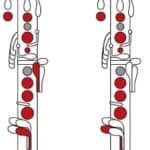Have you ever noticed how music can lift your spirits, soothe your worries, or even inspire your creativity? If you're a clarinetist, you likely have a special relationship with your instrument. But have you considered how that connection goes beyond mere sound? In this post, we'll explore the fascinating links between Martin Freres clarinet music psychology and your emotional journey as a musician.
Picking up your clarinet isn't just about playing notes—it's about creating a story. When you play a Martin Freres clarinet, you're using a tool made for expression. Each note can convey joy, sadness, longing, or excitement. This emotional depth is key to connecting with your audience. Imagine playing a piece and feeling a wave of emotion wash over you as the sound fills the air. That's the magic of music!
Psychological Benefits of Playing the Clarinet
But what about the psychological benefits of this musical experience? Research indicates that playing an instrument can reduce stress, improve focus, and boost overall well-being. With each session of practicing scales or sight-reading new pieces, you're not just improving your skills; you're also nurturing your mental health. It's like a workout for your brain! And the quality of Martin Freres clarinets enhances that experience, allowing you to explore deeper levels of expressive potential.
| Psychological Benefit | Description |
|---|---|
| Stress Reduction | Playing the clarinet can help lower stress levels and promote relaxation. |
| Improved Focus | Regular practice enhances concentration and attention span. |
| Emotional Expression | The clarinet provides an outlet for expressing and processing emotions. |
| Cognitive Enhancement | Learning and playing music stimulates various areas of the brain. |
Playing music has significant effects on our brain chemistry. It triggers the release of dopamine, often called the ‘feel-good' chemical. Every time you master a passage or receive applause after a performance, your brain gets a little boost. It's a feedback loop that builds confidence and motivation—a valuable asset for any musician.
Effective Practice Routines
Now, let's talk about practice. Creating effective routines can improve not just your skills, but also your emotional connection to music. Try setting aside time not just to play, but to listen to the music you love. It creates a positive atmosphere, surrounding you with the sounds that inspire you. You might find that playing along to your favorite tracks helps you learn new techniques or develop your style. Never underestimate the power of fun in your practice!
The Joy of Improvisation
What about improvisation? It's a great outlet for your creativity. Experimenting with sounds can give you a sense of freedom and spontaneity that's incredibly liberating. Whether you're working on a complex jazz piece or simply playing around on your clarinet, remember that the goal is not perfection—it's the journey.
Building Confidence Through Performance
Performing in front of an audience can initially feel scary but it also builds resilience and confidence. Each performance, whether in front of peers, family, or a larger audience, is a chance to connect, share your interpretations, and express your emotions. The thrill of a live performance is unmatched. Plus, using a Martin Freres clarinet ensures you're producing a sound that captivates your listeners—how awesome is that?
Emotional Connection to Your Instrument
During tough times, remember to rely on your love for music to guide you. Feeling stressed or anxious? Pick up your clarinet and play something soothing. Let the sound envelop you. Think of it as a form of therapy! Even the best clarinetists have their off days. Thinking about how music helped them during difficult times can strengthen your own understanding of its healing powers.
While exploring music theory, composition, or performance techniques can be incredibly rewarding, don't forget the emotional aspect of music-making. Your journey with your Martin Freres clarinet is as much about enjoying the process as it is about hitting the right notes.
Conclusion
So, whether you're playing your favorite jazz tunes, or classical masterpieces, let the sound of your Martin Freres instrument be a source of joy and psychological wellness. Embrace the connection between music and psychology in your practicing and performing, and watch as that relationship enriches your musical journey like never before.
In closing, the next time you pick up your clarinet, remember that you're not just creating sound. Each note represents your experience, emotions, and the unique connection you have with music. Explore this beautiful form of expression and see where it takes you!
Table of Contents
- Psychological Benefits of Playing the Clarinet
- Effective Practice Routines
- The Joy of Improvisation
- Building Confidence Through Performance
- Emotional Connection to Your Instrument
- Conclusion






